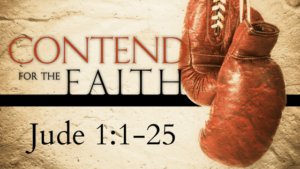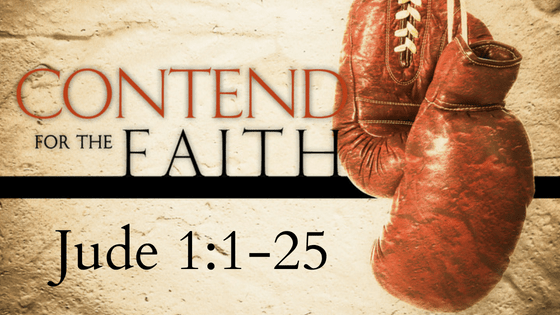
The book of Jude is yet another warning for today’s Christian church. We must know the truth and learn from biblical history! Deceivers and false teachers have infiltrated the ranks and are leading many astray.
Early church leaders were concerned about false teachings and rightly so. There’s nothing new under the sun as today, many have accepted unbiblical ideas or teachings because on the surface they might sound good. Few understand the underlying and ongoing war against the Truth.
The Apostle Paul spoke with the elders in Ephesus:
I know that after my departure savage wolves will come in among you, not sparing the flock; 30 and from among your own selves men will arise, speaking perverse things, to draw away the disciples after them. 31 Therefore be on the alert; ACTS 20:29-31
Now in leadership positions, deceivers have crept in and slithered through American denominations infecting countless victims. Some are subtle in their approach while others are blatantly heretical, denying the deity of Jesus Christ, promoting compromise under the guise of love; ambiguity, tolerance, homosexuality, mysticism, social justice, globalism, and universalism.
Some of today’s false teachers are under the umbrella of the emergent church which generally falls under the cult of Liberalism. This man-pleasing movement prefers to conform to this world and rejects the inerrancy of Scripture. They revel in the idea we are in a postmodern or post-Christian society, and often have a form of godliness but they deny the power of God and the Holy Spirit. This can fool those lacking a biblical foundation.
Charles Spurgeon once said,
“Discernment is not a matter of knowing the difference between right and wrong. It is knowing the difference between right and almost right.”
As disciples, followers of Christ, and lovers of the Truth, we must understand the times in which we live and warn others within the church. Thankfully, Jude gave us a detailed letter and an example to follow as to how to recognize and deal with false teachers and apostates who come against the Lord Jesus Christ and the eternal truths of Scripture. “Apostasy” simply means a departure from the true, biblical faith of Christ.
Historical Context and Introduction to Book of Jude
The book of Jude (“Judah” in Hebrew) was written just thirty-five years or so after Jesus Christ ascended to Heaven. Jude was not only one of four half-brothers of the Lord Jesus, but also a brand new convert to the faith. He was not one of the Apostles that lived and walked with Jesus, yet Jude chose to write about false teachers and the need to defend true, apostolic, biblical doctrines.
Matthew 13:55 lists the half-brothers of Jesus as “James and Joseph and Simon and Judas (“Jude” in Greek).” The Apostle John tells us none of Jesus’ brothers believed in Him – until after the resurrection. We don’t know much about Joseph and Simon, but Jude begins his letter by referring to himself as a servant of Christ and “brother of James.”
We know that James not only wrote the letter bearing his name, but he was the leader of the Jerusalem Council (Acts 15), a pillar in the church! This established some credibility for Jude right up front.
What could have caused these men to go from skeptics to bold disciples of Jesus Christ, and eventually martyrs for the faith? But Paul gives us the answer which may also be a key to the conversion of Jude as well.
In 1 Corinthians 15:7, we know that Jesus appeared to James!
Peter warned in advance about the coming of false teachers, while Jude wrote about their presence within the early church. In writing to several of the churches, Paul also wrote about deceptions such as Gnosticism, legalism, and worldly philosophy.
But false prophets also arose among the people, just as there will also be false teachers among you, who will secretly introduce destructive heresies, even denying the Master who bought them, bringing swift destruction upon themselves. 2 Many will follow their sensuality, and because of them the way of the truth will be maligned; 2 Peter 2:1-2
Four reasons the book of Jude was included in the Canon (A.D. 170): due to his being related to Jesus, the fact Jude was an eye-witness of the resurrected Christ, the inspired content of the letter, and Clement of Rome (A.D. 96) supported Jude as authentic.
It is believed by the time Jude wrote this epistle that all of the other apostles except John had already been martyred. Christianity was under severe political attack from Rome as well as infiltration by apostates. The true church has always been attacked both from without and from within!
Jude also alludes to nine different illustrations from the Old Testament. He describes the character and degenerate, wicked personal lives of the deceivers, and points out that their teachings are – just like modern times – clever, subtle, and enticing, but you can recognize them by their fake spiritual fronts.
Traits of an Apostate: (Verse ref. from Jude 1)
Ungodly, morally perverted, deny Christ (v. 4); defile the flesh, rebellious, ignorant (v. 8); dreamers, self-destructive (v. 10); grumblers, fault-finders, self-seeking, arrogant, flatterers (v. 16); mockers (v. 18); divisive, worldly minded, without the Holy Spirit (v. 19).
JUDE
Vs 1. Notice right from the start, Jude refers to himself humbly as a bond-servant, meaning he submitted to the Lordship of Christ.
He is writing to believers, “those who are called,” beloved, and “kept for Jesus Christ” – this doesn’t refer to an invitation but to an accepted salvation, to those who already have a relationship with Christ.
[Matthew Henry Commentary note]
Christians are called out of the world, from the evil spirit and temper of it; called above the world, to higher and better things, to heaven, things unseen and eternal; called from sin to Christ, from vanity to seriousness, from uncleanness to holiness;
“Beloved” by God – He loves all mankind, but there is an unconditional love toward His children, those who believe and are now set apart from the world because of their status in the kingdom. (We are citizens of heaven!)
Philippians 1:6 reminds us – He who began a good work in you will be faithful to complete it. God preserves the believer and secures us for eternal life.
Vs 3. While Jude was preparing to or had intended to write about the blessing of their common salvation in Christ, he was compelled to send this appeal to fight for the truth of the gospel. Since false teachers were starting to infect the early church, Jude decided to confront the problem.
“Contend earnestly” for the faith – notice the urgency to not only stand against apostates but strongly, firmly, defend the faith. In order to contend for the gospel of salvation, revealed truth from God, it is imperative to know sound doctrine, be discerning – able to determine truth from error, and willing to confront false teaching.
“once for all handed down” to the saints – God has shown the way of salvation through Jesus Christ, and His revelation is final; the truth has been delivered and cannot be edited.
It is our privilege and responsibility not only to know Christ better and to study the Word, but to preach the truth and fight to preserve it.
Vs 4. “certain persons have crept in unnoticed” (sounds like the church in America today). This carries the idea of infiltration and note this happened just decades after the resurrection. False teachers often pretend to be one of us, blending in outwardly while inwardly they are not even saved.
Their intentions are to get you to doubt God and His Word, to confuse or discourage Christians about doctrine, and to lead people astray. Nothing new under the sun! (“Did God really say…?” Genesis 3:1)
The men Jude warns about were ungodly, they perverted grace, and denied Christ. You can probably think of a few popular leaders today who fit this profile. This is a cancer in the church where believers who may have started out sincere now mock the spirit of grace.
“licentiousness” means unrestrained vice or gross immorality; how dangerous it is to think we have a license to sin because God is a loving, forgiving God. Today, some refer to this as hyper grace.
“Master and Lord, Jesus Christ” – Jude opens his letter declaring his allegiance to the Master and calls himself a bond-servant; here he emphasizes Jesus is “our only,” meaning the true believers’ one and only, whereas apostates deny Christ as sovereign Lord.
*False teachers, and false religions pervert what Scripture declares is true about the Lord Jesus Christ.
In verses 5-7 Jude wants to remind believers of consequences of sin and rebellion. Three examples, one in each verse:
- He warns about how unbelieving Israel perished in the wilderness
- He reminds us of the fallen angels, those who rebelled
- He points out the immorality/destruction of Sodom and Gomorrah
Vs 5. “saving people…destroyed those who did not believe” – is not only historical but prophetic about the end times. God miraculously delivered the nation of Israel from the bondage of Egypt, but they doubted His promise to bring them to the Promised Land. They eventually abandoned the faith and rebelled, and grumbled against God. That generation died in the wilderness.
Vs 6. “judgment… great day” – refers to the final judgment
Vs 7. Sodom and Gomorrah… to illustrate God’s judgment, the destruction of these two cities is used over 20 times in Scripture.
“Eternal fire” – a fire that can never be quenched (aka “hell fire”)
Vs 9. Michael the archangel (chief angel of God) that watches over Israel, leader of the holy angels (also mentioned in Daniel 10 re: spiritual warfare)
Vs. 10 – “these men revile things they do not understand…” They are “unreasoning animals.”
Note: the devil, aka Satan = accuser or slanderer
Railing judgment – interesting that the leader of God’s holy angels, Michael did not rebuke the devil directly, but said “The Lord rebuke you.” Believers are to call on God’s sovereign power to intervene in the midst of satanic attack or spiritual warfare. Our struggle is not against flesh and blood!
Vs 11. Rebellion of Korah – Korah, being a Levite, had duties in the tabernacle of God, but he rebelled against the authority of Aaron’s priesthood; he and 250 Jewish leaders rejected God’s anointed leadership of Moses and Aaron and as a result, came under divine judgment.
Vs 12. Like Clouds without water – (at first sight clouds are great) apostates bring hope of rain, but fail to satisfy; these men are like empty clouds promising spiritual life, but bring death. [MH COMM]
Trees without fruit – false teachers claim to produce but deliver emptiness. (remember Jesus cursing a fig tree in leaf?)
Vs 13. Wandering stars – apostates claim theirs is the way to spiritual knowledge but lack true direction; (could mean ‘shooting stars’ that flash quickly through the sky and fade away into nothing). BLACK darkness is reserved for them “forever”!
Vs 14. Many thousands of His holy ones – Not necessarily a prophecy from a book of Enoch, but a reference to the known tradition about the return of Christ and future judgment. (holy ones may refer to either angels or believers) Believers will have a role in the coming kingdom of Christ but angels are executioners of Gods judgment.
Vs 15. Jude uses the word “ungodly” four times! Ungodly men, ungodly sinners, ungodly deeds – deeds done in an ungodly manner. Notice also it’s not only actions of the ungodly being condemned here, it’s also things that were said against Jesus.
Vs 16. Grumblers, finding fault, speak arrogantly, flattering people – those who murmur, vent their disapproval of God’s ways, their words have little or no spiritual or eternal value, lacking substance, they tell people what they want to hear – not what they need to hear = truth in context from Scripture.
Vs 17. “But you…” Remember words spoken by the apostles – warnings of false teachers. By the Holy Spirit, the apostles wanted to protect the next gen. of believers.
Vs 18. Last time – refers to these days, the church age, from the time of the first appearance of Jesus the Messiah until He returns;
Jude mentions Mockers – deny God’s existence or His future judgment; ‘scoffers,’ use ridicule and want to mock the return of Christ in order to justify their sinful, ungodly living. (“there is no hell”)
JUDE 19. Cause divisions; worldly minded, devoid of the Spirit – they stir up debates and cause divisions (but accuse others of being divisive!) they may not even be saved; to not have (devoid) the Spirit is to not have spiritual life at all! But they arrogantly claim to have the answers and lead many astray.
Vs. 20. – “But you…” Building yourselves up – since Christ is the cornerstone of our faith we have a sure foundation to build on. Divine truth has been given through the apostles, prophets so we can strengthen our foundation by the word of God. (This includes a call to pray in the will and power of the Holy Spirit.)
Vs 21. Keep yourselves in God’s love; waiting expectantly – a call to remain in obedience to God (Jesus said if we love Him we’ll keep His commandments), and waiting anxiously refers to eager anticipation of Christ’s return to usher in the reality and final outcome of our faith: eternal life.
Vs 23. Save others; have mercy with fear – those who have bought into false teachings or following apostates need immediate attention and rescue. On some, believers are warned not to be influenced (polluted) by their sinful lifestyles during interactions.
Vs 24 & 25. Jude’s closing doxology returned to the theme of salvation which he hoped to write about (as stated in the first few verses), encourages believers regarding Christ’s protection from apostasy and ultimate deliverance, and reinforces the doctrine of Jesus’ deity, authority, and sovereignty.
* * *
TAKEAWAYS
Though Jude intended to write about the salvation believers in Christ share, he was compelled to warn Christians to contend for the faith against ungodly men, false teachers: they deny the truth and pervert the grace of God.
Jude reminds us that God saved the Jews out of Egypt, but later destroyed those who refused to believe. This should be a warning to the rebellious.
One trait of an apostate is they mock or revile things they don’t understand, such as Creation, the mystery of the incarnation, the Trinity, the inerrancy of Scripture, and other spiritual truths. Jude says “Woe to them!”
Some unique descriptors are used for false teachers: clouds without water, trees without fruit, and wandering stars “for whom the black darkness has been reserved forever.” Jude issues a call to remember the words of the apostles, and look expectantly for the return of Christ.
The closing benediction of Jude (24-25) is worth reading again:
Now to Him who is able to keep you from stumbling, and to make you stand in the presence of His glory blameless with great joy, 25 to the only God our Savior, through Jesus Christ our Lord, be glory, majesty, dominion and authority, before all time and now and forever. Amen.
OTHER SCRIPTURES
Genesis 3:1-4; Matthew 7:23-24, Mark 10:6-8, Mark 13;
Luke 13:22-24; Luke 17:2, Romans 6:1-2, Romans 12:2, Rom. 13:11,
Hebrews 13:8, Galatians 5:7-9, Revelation 3:11, 20; Rev. 22:18-19

